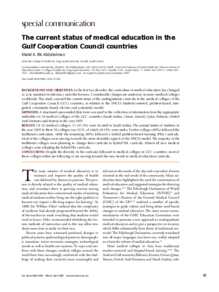Document
The current status of medical education in the Gulf Cooperation Council countries.
Identifier
DOI: 10.5144/0256-4947.2008.83
Source
Annals of Saudi Medicine. V. 28, 2, P. 83-88
Country
Saudi Arabia.
City
Riyadh.
Publisher
King Faisal Specialist Hospital and Research Centre.
Gregorian
2008-03-01
Language
English
English abstract
Background and Objectives: In the last two decades; the curriculum in medical education has changed so as to maintain its efficiency and effectiveness. Considerable changes are underway in many medical colleges worldwide. This study assessed the current status of the undergraduate curricula in the medical colleges of the Gulf Cooperative Council (GCC) countries, in relation to the SPICES (student-centered, problem-based, integrated, community-based, elective and systematic) model. Methods: A structured open-ended data form was used in the collection of information from the appropriate authorities in 30 medical colleges of the GCC countries (Saudi Arabia, Oman, Kuwait, Qatar, Bahrain, United Arab Emirates and Yemen) in the year 2005. Results: Of 30 medical colleges, 13 (43.3%) were located in Saudi Arabia. The annual intake of students in the year 2005 in these 30 colleges was 3225, of which 64.15% were males. Twelve colleges (40%) followed the traditional curriculum, while the remaining (60%) followed a hybrid problem-based learning (PBL) curricula. Most of the colleges were moving towards the more desirable aspects of the SPICES model. The majority of the traditional colleges were planning to change their curricula to hybrid PBL curricula. Almost all new medical colleges were adopting the hybrid PBL curricula. Conclusion: Despite the diversity in the curricula followed in medical colleges in GCC countries, most of these colleges either are following or are moving towards the new trends in medical education curricula.
Description
Annals of Saudi Medicine
Volume 28, Issue 2, March/April 2008, Pages 83-88
Volume 28, Issue 2, March/April 2008, Pages 83-88
ISSN
0256-4947
Category
Journal articles

